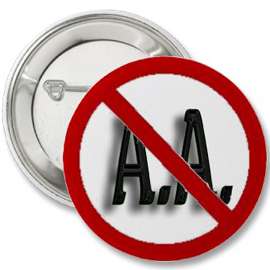Drug and alcohol addictions are not incurable, progressive diseases that usually end in death.
- And they are also not "spiritual diseases." The truth is that most people spontaneously recover, and simply "mature out of" addictive behavior. Eventually, most of them simply get sick and tired of being sick and tired, and wise up.
(Please note that I am not trying to minimize the horrors of alcoholism, or its deadliness. If 51% of all alcoholics recover on their own, that is "most people." That still leaves a lot of fatalities.)
Alcoholism is most assuredly not a disease "which only a spiritual experience can conquer", like Bill Wilson wrote. There is no such thing as a "spiritual disease", and alcoholics do not suffer from "spiritual diseases" that are caused by "resentments" (like Bill Wilson wrote in the Big Book, on page 64).
The "spiritual disease" of alcoholism resembles the "spiritual disease" of "candyism", which is the illness that children get from eating too much ice cream and candy.
The Alcoholics Anonymous definition of alcoholism is so goofy that A.A.-member therapists won't even agree with this statement:
"Alcoholism is caused by drinking alcohol."The A.A. founder Bill Wilson declared that alcoholism is a "spiritual disease" that is caused by
- sins,
- moral shortcomings,
- wrongs,
- defects of character,
- resentments,
- instincts run wild,
- character defects, representing instincts gone astray,
- self,
- self-will run riot,
- desires that have far exceeded their intended purpose,
- The Seven Deadly Sins
- a willful and irresponsible ego,
- failure to practice religious precepts properly,
- failure to practice Step Five properly,
- selfishness,
- self-seeking,
- self-centeredness,
- more selfishness
- defective relations,
- nagging wives,
- nagging wives again, "throwing her husband into a fit of anger"
- serious character flaws,
- faith that isn't accompanied by "self-sacrifice and unselfish, constructive action",
- personal secrets that we have not confessed,
- inherited genes or inherited sins,
- conditions that we couldn't correct to our entire satisfaction, and
- another unconfessed personal secret...
Notice that drinking alcohol is not on that list. Bill Wilson considered everything but drinking alcohol to be the real cause of alcoholism:
"Our liquor was but a symptom." (The Big Book, William G. Wilson, page 64.)
"After all, our problems were of our own making. Bottles were only a symbol." (The Big Book, William G. Wilson, page 103.)Alcoholics Anonymous actually teaches that alcoholics are "born that way", and have "character defects" like "alcoholic thinking" and "reacting wrong" that can be traced back to early childhood, even to a time before the alcoholic ever had his or her first drink:
Those who do not recover are ... men and women who are constitutionally incapable of being honest with themselves. They are not at fault; they seem to have been born that way.
The Big Book, 3rd and 4th Edition, page 58.A.A. co-founder Doctor Bob also declared that his alcoholism was caused by selfishness:
Unfortunately for me I was the only child, which perhaps engendered the selfishness which played such an important part in bringing on my alcoholism.
The Big Book, Alcoholics Anonymous, 3rd Edition, Dr. Robert Holbrook Smith, "Dr. Bob's Story", page 172.Another A.A.-promoting book declared:
"...it wasn't because my wife left me that I started to drink, or because my mother didn't love me. It was because I have always been a potential alcoholic."
Delirium Tremens, Stories of Suffering and Transcendence, Ignacio Solares, Hazelden, 2000, page 29.Fact: I've also always been a potential astronaut, and a potential Nobel Prize winner, and a potential rock and roll star, and a potential saint, too, but it never happened. I certainly was not doomed to those fates, without any choice in the matter.
So what was the real reason that guy became an alcoholic? How about, he felt bad, and wanted to feel good? How about, he was an abused child of an alcoholic parent, growing up in a dysfunctional family, and that's why he was always different, and felt different, even from early childhood?

No comments:
Post a Comment